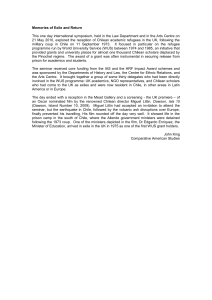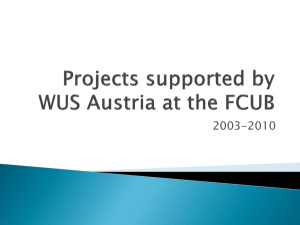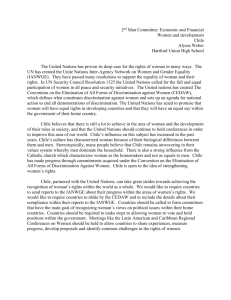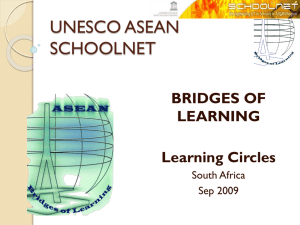Alan Phillips
advertisement
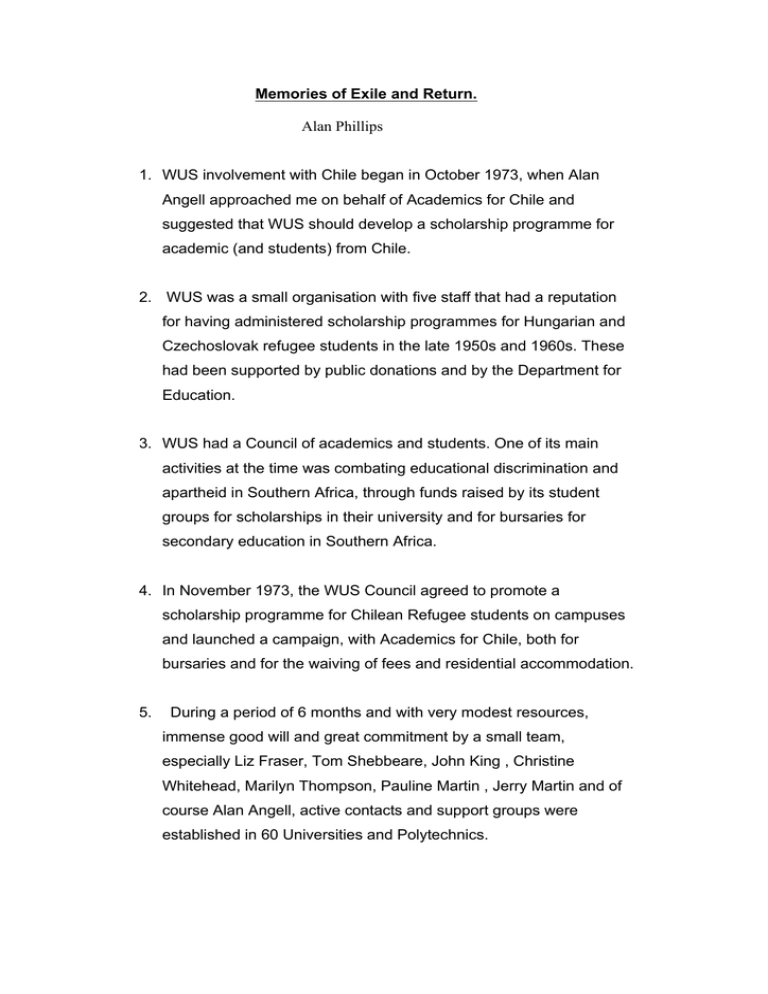
Memories of Exile and Return. Alan Phillips 1. WUS involvement with Chile began in October 1973, when Alan Angell approached me on behalf of Academics for Chile and suggested that WUS should develop a scholarship programme for academic (and students) from Chile. 2. WUS was a small organisation with five staff that had a reputation for having administered scholarship programmes for Hungarian and Czechoslovak refugee students in the late 1950s and 1960s. These had been supported by public donations and by the Department for Education. 3. WUS had a Council of academics and students. One of its main activities at the time was combating educational discrimination and apartheid in Southern Africa, through funds raised by its student groups for scholarships in their university and for bursaries for secondary education in Southern Africa. 4. In November 1973, the WUS Council agreed to promote a scholarship programme for Chilean Refugee students on campuses and launched a campaign, with Academics for Chile, both for bursaries and for the waiving of fees and residential accommodation. 5. During a period of 6 months and with very modest resources, immense good will and great commitment by a small team, especially Liz Fraser, Tom Shebbeare, John King , Christine Whitehead, Marilyn Thompson, Pauline Martin , Jerry Martin and of course Alan Angell, active contacts and support groups were established in 60 Universities and Polytechnics. 6. This relentless, sleepless team work led to 50 academics and post graduate students being found fully funded places in Universities. Additionally the fundraising campaign raised over £39,000 from public donations and grants by foundations, that can be multiplied ten times for today’s prices. 7. This was valuable in its own right, but also provided a platform of support for me to write on behalf of WUS to the new British Government in March 1974 and request support from the ODM. WUS had demonstrated that it could put an effective system in place to offer practical support to Chilean refugee scholars attracting public support. 8. As General Secretary I lobbied government, with the support of academics for Chile. This was problematic as Judith Hart’s commitment for Chile was not shared by most of the cabinet and there was great wariness among civil servants in the British Overseas Development Ministry, and hostility by officials in the Foreign Office and the Home Office. A special visa arrangement was made to simplify procedures but this proved highly problematic. 9. Some of the concerns were legitimate and needed discussing, e.g. the ways in which the overseas aid act could be interpreted, the competence and capacity of WUS, others were more far fetched e.g. the risk of bringing violent extremists to the UK. Other objections, often unvoiced, were based on political prejudice and foreign policy pragmatism, emphasising the need to protect British current interests in Chile. 10. Consequently there was “a marriage made in heaven” between AFC and WUS. It was possible for me to request funding on behalf of a non political charitable organisation, putting forward the humanitarian and development case to Judith Hart’s private office and her political advisers, who were most supportive, while discussing and negotiating technicalities with the relevant department and desk in the ODM. 11. When the letter of approval for funding was received in July 1974 we established a WUS awards committee that included ODM officials, alongside Alan Angell and several others from Academics for Chile. I was able to persuade Dudley Seers (Director of IDS)- who attended Academics for Chile meetings- to Chair the awards committee. 12. This programme was one of the most complex demanding ones I have been involved with in almost 40 years of human rights work. 13. On the one hand many people whom we were assisting were or had been in danger, some had been tortured, were in hiding or in prison and there were many challenging issues of adaptation and settlement, of understanding British cultures, English language, the social and education system while coping with the pain of exile and the hopes for the future. 14. On the other hand WUS has to organise long, sometimes secretive, lines of communication, extending from those in secret addresses in Chile to FLACSO and CLACSO in Chile and Argentina, to WUS in London, to University Departments and to individual academics, who offered crucial advice matching individuals to courses. 15. There was complexity at every stage with the British Government ministries. Each and every award had to be negotiated in committee, each and every person had to have security clearance and visas processes, each and every person needed to be counselled and offered options. Furthermore each and every year funding for the programme had to be negotiated causing much uncertainty in WUS and organisational risks. We did our best, sometimes we may not have got it right but it was not through lack of commitment; I wish we could have done more. 16. Despite Judith Hart being out of office as minister within a year, the programme was sustained over a 10 year period. It succeeded in assisting 900 Chileans to continue or complete their studies at a cost of some £ 11 million at that time. We all know the programme literally saved many lives and provided a source of moral and practical support for a much wider larger number of family members. Is it possible now to review aspects of the impact of the programme 35 years on to learn for the future? 17. After the major Chilean scholarship programme developed, WUS was able to use this experience, its contacts and its reputation to develop other major scholarship programme for refugee students, often postgraduate students, from Ethiopia, Uganda and Vietnam in the United Kingdom as well as scholarship programmes in Africa. 18. Almost all of WUS historic data is lost, except for the diligent and foresighted work of Liz Fraser, there would be few records on the Chile programme. These are now archived in the Modern Records Centre at Warwick. While we can, it is crucial to build the written archive and reinforce it with oral memories. Can all of us here help find additional information and record our own memories? 19. Support was also provided to enable completing students to return to Latin American and Chile to contribute to local development, when it became safe to do so, although WUS attempted, but failed, to obtain funding for a broader Latin American scholarship programme. 20. While WUS’ s work was with students and academics it was acutely aware that the structures in place to support refugees arriving in Britain were antiquated and inadequate. The remarkable work of the Joint Working Group for Chilean Refugees and the Chile Committee for Human Rights led by Wendy Tyndale overcame some of these obstacles, but I will leave Wendy to describe this and our excellent cooperation together. 21. Once the Scholarship programme was established, considerable support was given, with Amnesty and others, to the Joint working Group for Refugees from Chile. Eventually WUS used its practical experience and good reputation, to work with other support groups and organisations like Christian Aid and Oxfam to transform the refugee landscape, helping to form the British Refugee Council, which was then able to provide much more effective statutory support for refugees. It has been a major force for good, for realising the human rights of refugees over the last three decades. 22. At the same time WUS successfully campaigned for student grants for refugee students in the UK, which was accepted in 1979, first of all under the Labour government and Shirley Williams, and then after the election by the incoming Conservative administration. 23. Experience was developed in providing counselling, language training, and support for refugees, including providing support for the establishment of refugee community groups that was later to become a cornerstone of some of the later work of the British Refugee Council. Could this be an important area for information gathering and research that may impact on future work? 24. The programme educated us all and deepened the commitment and competence of many of us to promote human rights and development programmes over the last three decades. I made many friends and I am so happy to renew some of these friendships today after almost 30 years. Let me thank you John King, and your colleagues at Warwick University, for your excellent work in organising this workshop and for making this rich discussion possible. Alan Phillips General Secretary WUS (UK) 1973-1981
